Squash is a tasty and nutritious vegetable that chickens love to eat. But can chickens eat squash? The answer is yes! All types of squash, including zucchini, pumpkin, acorn, and butternut, are safe for chickens to eat.
Squash is an excellent source of dietary fiber and vitamins A and C for chickens. It also contains small amounts of B vitamins and minerals such as calcium and magnesium. These minerals help build strong bones and keep muscles healthy in growing chicks and older hens. Additionally, the high water content in squash helps keep your flock hydrated during hot weather.
However, like all treats, squash should only be fed to chickens in moderation. Let’s take a closer look at the benefits of feeding your chickens squash.
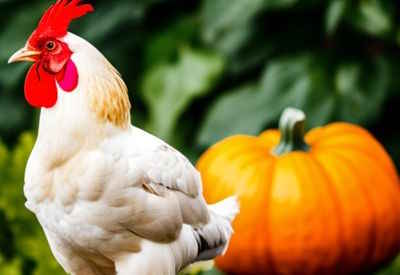
Can chickens eat squash?
Yes, they can! Squash is a safe and nutritious treat for chickens. Squash can be a great addition to your flock’s diet as long as it’s served in moderation. The high fiber content in squash makes it especially beneficial for laying hens, who need extra fiber to produce eggs with strong shells.
The soluble fiber in squash also helps keep your hens’ digestive systems running smoothly by speeding up digestion and preventing constipation. Lastly, the antioxidants contained in squash will help keep your flock healthy by boosting their immune systems against common diseases.
While it’s true that chickens can safely eat squash, it should not be used as a primary food source because it lacks some essential nutrients that chickens need daily. Instead, feed your flock high-quality chicken feed supplemented with occasional treats like fresh fruits or vegetables like squash.
[ChickenAffiliate]
The benefits of eating squash for chickens
Squash is a nutritious, easy-to-find vegetable that can benefit chickens in several ways. It is packed with vitamins and minerals to help keep your chickens healthy and happy. Let’s look at the five main benefits of feeding squash to your chickens.
Improved Digestion
Squash is high in fiber, which helps with digestion and encourages healthy gut bacteria. Chickens love to peck and scratch at the squash, so it’s also a great way to occupy them while eating. Plus, adding squash to their diet gives them more variety in what they eat.
Nutritional Boost
Squash contains many vitamins and minerals, including vitamins A, C, potassium, magnesium, iron, copper, and manganese. These vitamins and minerals help keep your chickens healthy by boosting their immune systems and providing essential nutrients for growth.
Weight Control
Squash is low in calories but packed with nutrition, so it’s an excellent option for chickens trying to stay healthy or lose weight without sacrificing nutrition. It also helps provide energy without being too filling – perfect for active birds.
Easy To Find & Prepare
Squash is readily available year-round at most grocery stores or farmer’s markets, so you won’t have trouble finding it. And don’t worry about preparing it – just cut it into small pieces and serve it raw or lightly cooked for your chickens to enjoy.
Fun & Enjoyable
Chickens love pecking away at the squash as they eat – it adds an element of fun while they snack. Plus, if you add some seeds or nuts inside the squash before cutting it up, your chickens will have even more fun looking for those hidden treats!
Things to watch out for when feeding squash to chickens
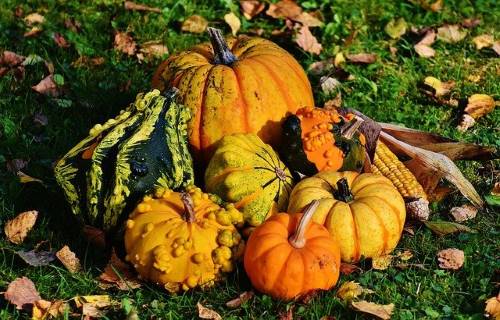
If you’re a backyard chicken owner, you’ve considered adding squash to your feathered friends’ diet. But you should keep a few things in mind before feeding squash to your chickens. So let’s look at what those things are.
Choose the Right Squash
When selecting squash for your chickens, ensure they are organic and free from chemical treatment or pesticide residue. Chickens have sensitive digestive systems, so they mustn’t eat anything that could be harmful to them.
Also, pick smaller squashes – larger ones can be difficult for chickens to digest.
Cut it Up into Bite-Size Pieces
Chickens can’t easily bite into whole pieces of squash as we can, so make sure you cut it up into small enough pieces for them to eat comfortably. This also helps ensure that they get all the nutrition from their food without leaving any behind.
To avoid waste, give your chickens just enough pieces for one meal — any leftovers should be thrown away after 24 hours as they may spoil quickly in warm weather.
Avoid Too Much Sugar
Some types of squashes (such as butternut or acorn) contain higher sugar levels than others (like zucchini). Feeding these kinds of squash too often or in large quantities could cause health issues such as weight gain or egg production problems in your chickens due to the high sugar content.
A good rule is not to feed more than ¼ cup per chicken daily for sweeter squash varieties.
How often should chickens eat squash?
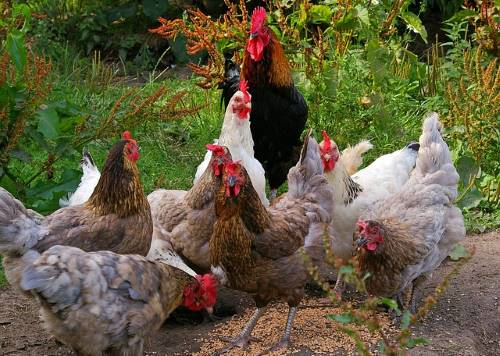
Squash can be an excellent treat for chickens, but it should not be an everyday occurrence. Instead, it should only be given as an occasional snack. When providing squash as part of your chicken’s diet, try limiting it to 10% of their total feeding.
Serving squash too often can give them digestive problems and upset the balance of minerals and vitamins in their diet. Adding squash to your chicken’s diet is a wonderful way to give them some variety, but moderation is key.
How to prepare squash for feeding to chickens
Squash is an excellent source of vitamins, minerals, and carbohydrates that can be fed to chickens. But how do you go about preparing squash for your feathered friends? Read on to find out.
Wash First
Before giving any food to your chickens, it’s essential to ensure it is clean. This means washing the squash with cold water. Doing this will help prevent bacteria or parasites from getting into the food and affecting your chickens.
Chop or Feed Whole
After you have washed the squash, you can chop it up into small pieces or feed it whole. If you are feeding it whole, ensure it is not too big for your chickens to eat comfortably. You should cut up large chunks so they can handle them more easily.
No Need To Peel Them
There’s no need to peel the squash before feeding them to your chickens since the skin contains many valuable nutrients. However, if there are any blemishes on the skin that could cause a health risk for your hens, then peeling them would be a good idea.
Feed Raw or Cooked
You can feed raw squash as-is or cook them before giving them to your birds. If you choose to cook them, steaming or boiling are both good options since these methods won’t remove too many of their nutritional benefits like frying would.
Regardless of your choice, ensure the squash is cooled down before feeding them to your hens, so they don’t get injured.
Can baby chickens eat squash?
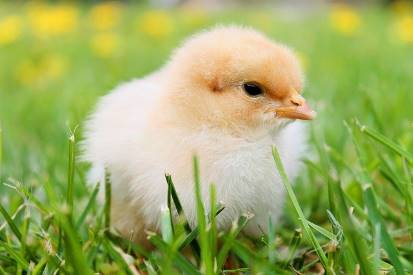
Baby chickens can eat squash, but not as much as adult chickens. It is important to be aware that before giving squash to baby chicks, it is best to cook it. This helps with easier digestion and ensures that none of the strands of the squash will choke them.
Squash itself is full of nutrients, so it should occasionally be included in their diet. Although more care needs to be taken when giving small creatures food, with a bit of digging you are sure to find out if it is safe for them or not.
Can chickens eat the skin of squash?
Chickens can eat squash skin, although they may not find it too tasty. However, most chickens love trying out new food and would probably enjoy the taste of squash skin.
However, its tough texture could pose a challenge for their beaks, so you’ll want to monitor your chickens when they have access to these treats. Additionally, you’ll want to ensure that the squash has not been exposed to pesticides, which could make it unsafe for them to consume.
With diligence, you can ensure that your chickens can still reap the rewards of this delicious and nutritious vegetable.
Can chickens eat squash seeds?
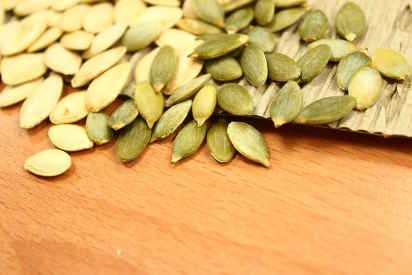
Squash seeds are a great option to feed chickens – they are safe for them to eat, and they also really enjoy the taste! On top of that, they’re filled with essential nutrients such as protein and essential fatty acids, making them highly nutritious for your flock.
It’s an easy snack to give your chickens, which will quickly become their favorite treat.
Can chickens eat the leaves of squash?
It is generally safe for chickens to eat the leaves of a squash plant, but they may not particularly like its taste. If you do decide to feed them the leaves from a squash plant, make sure there are no pesticides; organic produce is always safest for your feathered friends.
Pick off any black or discolored leaves, as these are more likely to contain higher levels of toxins and other harmful chemicals that could endanger the health of your chickens.
What are the different types of squash?
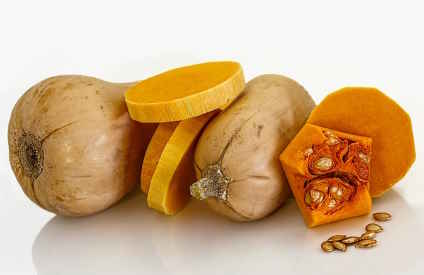
Before you go out and purchase all kinds of squash, it’s important to understand the differences between each type. Let’s examine some of the most popular squash varieties and their unique characteristics.
Butternut Squash
Butternut squash is one of the most common types of squash available. It has an oblong shape and is usually light tan with pale yellow-orange flesh. The flesh is thick and creamy, making it a great source of vitamins A, C, and E and fiber and minerals like potassium, magnesium, and phosphorus.
When cooked, butternut squash can be mashed or pureed in soups and casseroles or baked into bread or muffins.
Acorn Squash
Acorn squash has deep green skin with orangey-yellow markings around its ridges. Inside, it has a bright yellow-orange flesh that’s sweet with a slightly nutty flavor. This squash is also high in vitamin A, iron, calcium, magnesium, and zinc.
Acorn squash halves can be roasted in the oven or stuffed with other ingredients like sausage or apples for an easy one-pan meal.
Spaghetti Squash
Spaghetti squash is unique because when cooked, it shreds into thin strands that resemble spaghetti noodles – hence its name. It has an oval shape with pale yellow skin and bright orange flesh on the inside.
Spaghetti squash is also extremely low in calories while providing essential vitamins such as vitamins C and B6, folate, and magnesium. To cook it, cut it in half lengthwise and then bake until tender before shredding the threads using two forks.
What other vegetables can chickens eat?
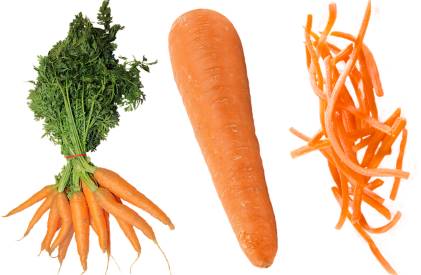
Chickens usually get most of their protein from bugs and worms, but vegetables can be a great way to supplement their diet. Squash is one of the most popular vegetables to feed chickens, but other options are also available. So let’s look at what other vegetables chickens can enjoy besides squash.
Carrots
Carrots are an excellent source of vitamin A, which helps keep chickens healthy and strong. Carrots can be served either raw or cooked, whichever your chickens prefer. If you serve them raw, cut them into small pieces, so your chickens don’t choke on them.
Be careful not to feed too many carrots; too much vitamin A can lead to health problems for your chickens in the long run.
Read More: Can Chickens Eat Carrots? 6 Fantastic Benefits
Potatoes
Potatoes are high in carbohydrates and provide a good source of energy for your chickens. However, like carrots, you should limit how many potatoes you feed your chickens since too much carbohydrate can lead to health issues like obesity.
Cooked potatoes should be served in moderation as part of a balanced diet for your flock.
Read More: Can Chickens Eat Potatoes? The Definitive Answer
Pumpkin
Pumpkins are rich sources of antioxidants and vitamins essential for a chicken’s overall wellbeing. These vegetables should be served cooked; steaming or boiling is recommended over roasting or frying to help preserve the nutritional value of these veggies.
Since they have soft interiors, it’s important to chop them up into small pieces before serving them to avoid any choking hazards.
Read More: Can Chickens Eat Pumpkin? 5 Amazing Benefits
Zucchini
Zucchini is a summer squash high in vitamin C, potassium, and magnesium. It can be served raw or cooked and cut into small pieces to avoid choking.
Zucchini can be a great way to add variety to your chickens’ diets, but it should be served in moderation.
Read More: Can Chickens Eat Zucchini? 6 Excellent Benefits
Sweet Potatoes
Sweet potatoes are an excellent source of beta-carotene, which helps keep feathers looking bright and shiny while providing extra energy for active flocks.
Sweet potatoes can be served raw or cooked and should be cut into small cubes to avoid choking hazards. Sweet potatoes should also not be overfed as they can cause indigestion in chickens if given in large amounts.
Read More: Can Chickens Eat Sweet Potatoes? 5 Important Benefits
Can chickens eat squash – final thoughts
Squash is a delicious treat that provides numerous health benefits when fed to chickens in moderation. It contains essential vitamins and minerals needed for proper growth and development, and its high fiber content helps regulate digestion. At the same time, its antioxidants boost immunity against common diseases.
So go ahead – give your flock some nutritious squash today. However, remember not to overdo it; no more than 10% of their diet should consist of treats like this.
Related Articles:
